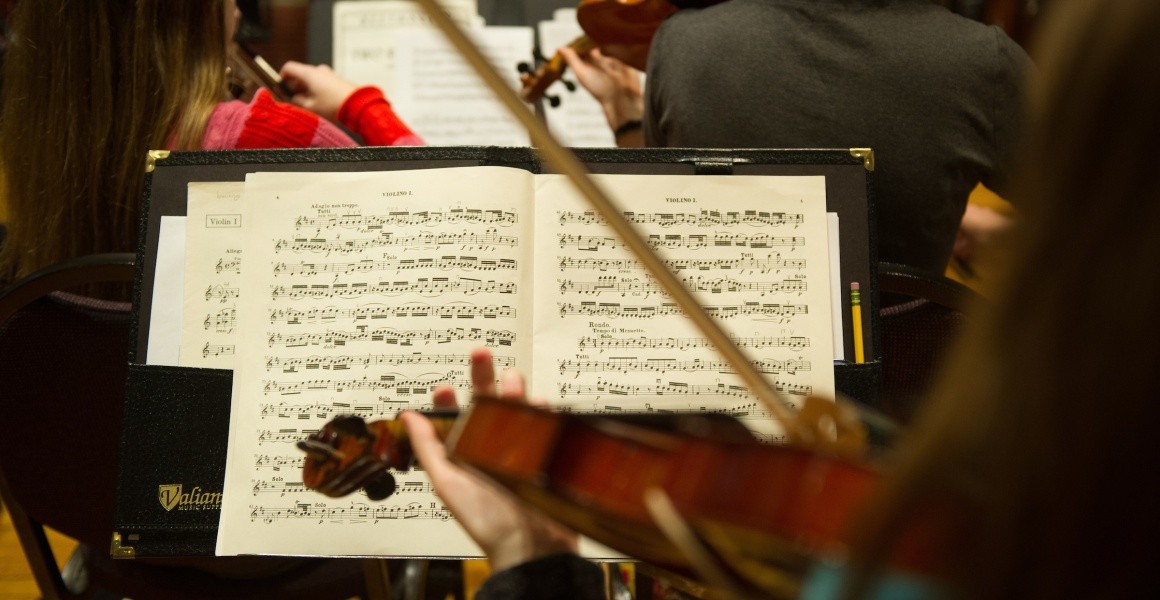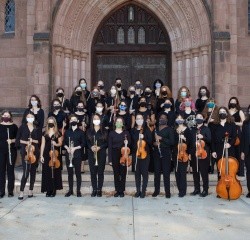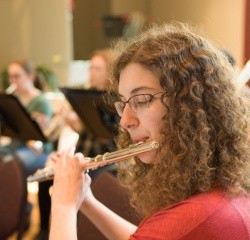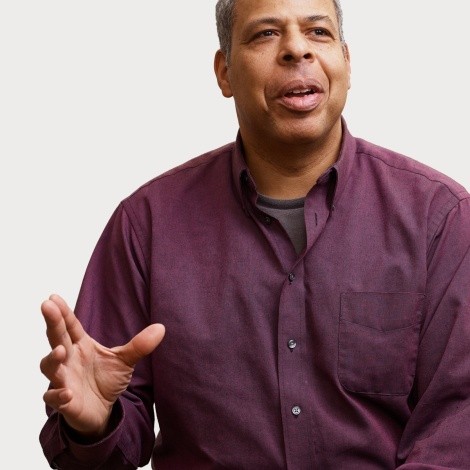Introductory classes in fundamentals, music history and literature, composition, and music technology are offered for students with little or no experience; those with more experience may be able to exempt prerequisites and enter directly into the music theory or music history course sequence.
Students who demonstrate a thorough knowledge of the rudiments of music will be exempted from MUSIC-100, which is a prerequisite for certain courses and a requirement for individual performance studies (please see below). For information on the theory placement exam, please contact the department.
MUSIC-100 Rudiments of Music
In this half-semester course students will become familiar with the elements of music notation (staves, clefs, pitch names, note and rest values) and with some of the basic skills necessary for college-level music instruction (e.g., construction and identification of scales, intervals, triads, and basic diatonic functions).
MUSIC-102 Music and Technology
It is now possible to create electronic music with a variety of powerful and flexible computer-based tools. Through reading, discussion, demonstration, listening sessions, technical tutorials and hands-on projects, we will explore the techniques, practices and aesthetics surrounding creative applications of current and emerging music technologies, including sound recording and editing, mixing, synthesis and electronic music composition.
MUSIC-103 History of Jazz
This course will follow the origins and evolution of jazz from the late nineteenth century to the present, with emphases on prominent stylistic trends and significant individuals. Along with some analysis of the musical language jazz employs, the music will be examined in its relation to the social contexts that helped produce and shape it. The ability to read music is not a requirement for this course.
MUSIC-117 Foundations of Voice
This course will introduce singers to the physiology of human voice and healthy vocal technique through readings and visual sources on vocal anatomy. Students will examine vocal repertoire spanning approximately 500 years, explore various Western/international singing styles in English, Italian, French, German, etc., as well as receiving an introduction to diction, the International Phonetic Alphabet (IPA), and its application to various languages. Music of composers from historically marginalized backgrounds will be highlighted. Theoretical knowledge will culminate in practical demonstrations via presentations and performances in class.
MUSIC-128 The Spectacle of Music Storytelling
This course offers an introduction to the vast and dynamic world of opera, tracing its evolution from its origins to the present day. We will explore canonic masterpieces-works that shaped the history of opera, have stood the test of time, and remain central to opera house repertoires worldwide. Along the way, we will examine the essential elements that bring opera to life: libretti, vocal fachs, staging, orchestration, and performance practice. Each opera studied will serve as a lens through which we discuss key artistic and cultural concerns of composers, librettists, performers, and audiences alike.
MUSIC-134 Girl Groups from Medieval to Motown
The term "girl groups" typically refers to the close-harmony all-women pop groups of the 1950s and 1960s. Yet groups like the Andrews Sisters, the Shirelles, and, most famously, the Supremes, represent only one manifestation of a centuries-long musical practice in which groups of young women have sung together, from enslaved women of the medieval Islamic world to the concerto delle donne of Renaissance Italy to Vivaldi's young pupils at the Ospedale della Pietà. For centuries, these groups have enthralled listeners and inspired composers. This course looks at the history of this musical phenomenon, with critical attention to its spaces, reception, and relationships and what they tell us about gender and musicking over time.
MUSIC-136 Adventures in Music
This course delves into the intricate world of auditory perception, exploring how humans interpret, experience, and make sense of sound. Students will journey through the art of hearing, discuss the sensations of hearing, how sound colors our perception of the world, and how the sound worlds we live in are increasingly curated and constructed. The course will cover a range of topics, including historical definitions of pitch, time, and sound forms, and the influence of cultural and environmental factors on how we perceive sound. We will also investigate the role of hearing in communication, music, and soundscapes, and consider how technological advancements are transforming the way we interact with sound. Through hands-on experiments, critical listening sessions, and interdisciplinary readings, students will gain a holistic understanding of sound perception, learning to appreciate its profound impact on human experience. By the end of the course, participants will have developed an enhanced awareness of the role sound plays in shaping our environment and our lives.
MUSIC-139 Music of the 1970s
Remembered primarily for being the decade when popular music demanded a reality check, the 1970s will be the framework for a critical and analytical survey of some of the more fertile developments and influential ideas that originated, flourished, and/or declined in that era. Topics will include minimalism, jazz-rock fusion, reggae, disco, punk, and the accompanying multiculturalism that informed social/political/economic conditions that bred these styles.
MUSIC-202 Electronic and Computer Music
This course will explore a range of approaches and techniques involved in the creation of electronic and computer music, including aspects of form and development, analog and digital synthesis and signal processing, basic computer music programming, and audio recording and production techniques. The focus of this seminar will be a series of exercises and creative projects that develop aesthetic and technical abilities. This creative work will be supported and enriched by selected reading and listening examples, as well as ongoing technical labs and demonstrations.
MUSIC-203 Acoustic Ecology and Sonic Art
The field of acoustic ecology is particularly concerned with how we create, interpret and interact with the sounds around us and how imbalances in the soundscape may affect human health and the natural world. Through reading, discussion, listening sessions, independent research, and hands-on projects, we will examine the broad interdisciplinary fields of acoustic ecology and sonic art. We will engage historical, conceptual, and aesthetic aspects of sound as a cultural, environmental, and artistic medium, with an emphasis on listening, psychoacoustics, soundscape studies, field recording and soundscape composition. We will question predominant ideas regarding the relationships between location, environment, sound, silence, music, and noise, and test these ideas through individual and group research as well as hands-on sonic art projects.
MUSIC-215 Intermediate Composition
Students will explore a number of musical styles and approaches in the process of creating their own extended works, with the possibility of performances at the end of the semester.
MUSIC-217 Foundations of Voice II
This course is designed as a follow-up to MUSIC-117, Foundations of Voice I, with a primary focus on in-class study, singing, and accompanying of Western Art songs and International Folk songs (Mexican, French, Arabic, Czech, German, American). Course study will include an overall examination of composers, performance practice, musical styles, poetry, structural form, and nationalistic characteristics. All students will participate in regular in-class performances of music by well-known as well as historically marginalized composers. Music by Purcell, Mozart, Fanny Mendelssohn, Schubert, L. Boulanger, Dvor´k, Crawford Seeger, Fauré, Price, Ravel, Beach and more.
MUSIC-220 Music and Film
This course is for all who stay to the end of the credits, purchase soundtracks, and argue over who should have won the Oscar for Best Score, along with anyone else interested in the undervalued importance of music to the general effect of a motion picture. We will explore and discuss the myriad ways in which these two media interact. The course will focus on classic scores by Herrmann, Morricone, and Williams, as well as the uses of pre-existing music in films of Kubrick and Tarantino.
MUSIC-226 World Music
This course is a survey of selected musical traditions from different parts of the world, including Africa, Indonesia, Indian, the Caribbean, and the United States. The course adopts an ethnomusicological approach that explains music as a cultural phenomenon, and explores the social and aesthetic significance of musical traditions within their respective historical and cultural contexts. It examines how musical traditions change over time, and how such changes reflect and relate to social and political changes within a given society. Weekly reading and listening assignments provide the basis for class discussions.
MUSIC-228 African Opera in Theory and Practice
In this course, African opera will provide the framework for exploring salient features of African music. The course will begin by examining African performance practices, including the organization of ensembles, the role of dance, musical storytelling, and operatic forms. The course will then feature rehearsals and class visits by professional vocalists and African drummers, followed by an ethnographic reflection. The course will culminate in a public performance of an African opera by students and professional musicians at Chapin Auditorium, Mount Holyoke College. The opera to be performed this semester is a newly composed work titled Funmilayo. It focuses on the life of Funmilayo Ransome-Kuti (1900-1978), a Nigerian pioneer activist who, in the 1940s, campaigned against British colonial rule and resisted the marginalization of women in local government administration. The practical sessions will allow students to reflect on the theoretical and cultural issues examined earlier in the semester and gain practical knowledge of the African operatic tradition.
MUSIC-231 Theorizing Classical Music
Studies diatonic harmony (part-writing, inversions, harmonization, figured bass and non-harmonic tones) and begins the exploration of chromaticism. Includes analysis, aural skills, and keyboard harmony.
MUSIC-234 Early Music Performance Practice: Sing Like Dido; Play like Orpheus
How do we know how the art music of Europe was performed 400 years ago? What does it mean to sing and play in a historically informed manner in the modern era? How do we improvise and ornament? How do we shape this music, expressing its style and drama? This course introduces a practical application of early music performance practice, and examines the historical, editorial, and theatrical aspects of masterworks such as Monteverdi's Orfeo, Purcell's Dido and Aeneas, Bach's St. Matthew Passion, Jacquet de la Guerre's Judith, and more. The course will include regular in-class performances or presentations, opera screenings, and a field trip to a major early music performance in Boston.
MUSIC-236 Pop Song / Jazz Tune
Pop and jazz involve different types of musical texts. From open mic nights to top-40 hits, pop performances are enactments of carefully crafted song structures. In contrast, jazz musicians treat tunes more flexibly-as frameworks to guide improvisation. In separate units for the pop song and the jazz tune, this course examines how harmony, melody, rhythm, lyrics, and form unite to inspire great performances in both traditions. Each unit will include nuts-and-bolts assignments to build analytical and compositional skills, which will be applied in a composition project at the end of each unit.
MUSIC-238 The Power of Black Music
The course focuses on the musics of Africa and the African diaspora through the lens of ethnomusicology. Concentrating on countries like Brazil, Cuba, Nigeria, South Africa, and the United States, it examines the musical performance of gender, race, ethnicity, and nationality and the role of music in social and political movements. The course explores the global dimensions and resonances of Africanist musical cosmopolitanism as enabled historically and sustained through ongoing transatlantic exchanges between Africa and the African diasporas. Other topics covered include the global rise of Afrobeats, and the issues of representation in iconic works like Black Is King and Lemonade by Beyoncé.
MUSIC-242 Conducting I
Fundamentals of conducting: gestures, rehearsal techniques, study of representative short scores, and practice leading primarily choral ensembles. Videotaping, class recital.
MUSIC-249 Topics in Music
MUSIC-249MU Topics in Music: 'Language, Music and the Mind'
This course explores the interplay between language, music and cognitive skills. For centuries, questions about the relationship between language and music have been asked by philosophers, artists, and scientists. Is music a language and is language a music? What is the evolutionary value of language and music? What are the formal characteristics that are shared between the two? What happens in the human mind when language or music breaks down? How can we design interdisciplinary studies to look into language and music? While no prior music education is required, the course will provide a comprehensive overview that bridges gaps between linguistics, music theory, and cognitive science.
MUSIC-281 History of Western Music I: Music to 1700
The first in a four-semester survey of Western music history, MUSIC-281 examines the cultures of art music in Europe and Americas to 1700, focusing on evolution of style and the changing roles of composers, performers, patrons, and audience.
MUSIC-282 History of Western Music II: Music from 1700 to 1850
The second in a four-semester survey of Western music history, MUSIC-282 examines the cultures of art music in Europe and the Americas from 1700-1850, focusing on the evolution of styles and genres and the changing roles of composers, performers, and audiences.
MUSIC-283 History of Western Music III: Music from 1850 to 1950
The third in a four-semester survey of Western music history, MUSIC-283 examines the cultures of art music in Europe and the Americas from 1850 to 1950, focusing on the evolution of styles and genres and the changing roles of composers, performers, and audiences.
MUSIC-284 History of Western Music IV: Music Since 1950
The fourth in a four-semester survey of European and Eurocentric classical music, covering the period since 1950 and changes in how composers interacted with performers, audiences, critics, institutions, and society at large. We trace these changes through a fast-paced survey of representative works, including music by women composers, composers of color, and LGBTQ+ composers. We build skills in score reading, understanding musical forms and genres, interpreting primary sources, and writing music history. Course theme: Music and the Machine. How have new technologies of notation, recording, broadcast, and digital media affected music since 1950, and the ways it is performed and understood?
MUSIC-299 Creative Career Strategies and Music Entrepreneurship
This combined lecture series/seminar will expose students to a wide range of career options available in music and music-related fields. Guest speakers will present broad and varied approaches to creating a meaningful career in music, as well as sharing specific strategies, resources, and advice. This seminar will also include course readings and discussion, as well as skill building in entrepreneurial thinking and professional aspects of career development.
MUSIC-302 Projects in Sound and Media Arts
This innovative arts and technology course will explore emerging creative/technical practices that transcend any single medium or discipline. While sound will be a primary focus of the course, students will design, realize, and collaborate on projects that may also include still or moving images, text, graphics, installation, computation, interactivity, performance, etc. Class meetings will combine seminar-style discussions with listening, viewing and hands-on lab sessions, brainstorming, project development and feedback. Guest artists' visits and collaborations with other MHC arts and tech classes will enhance your exposure to sound and media arts practitioners.
MUSIC-315 Advanced Composition
Students will explore a number of musical styles and approaches in the process of creating their own extended works, with the possibility of performances a the end of the semester.
MUSIC-321 Advanced Interdisciplinary Topics
MUSIC-321AM Advanced Interdisciplinary Topics: 'Art, Music and the Brain'
Art and music are a part of all human cultures. Is there something about the human brain that drives us to paint and sing? We will examine how the brain simultaneously processes different aspects of visual and auditory stimuli, ask how this processing may affect the way we do art and music, and explore where these phenomena may occur in the brain. As we engage in discussion and hands-on activities, we will discover the commonalities between the arts and the sciences including practice, experimentation, exploration, innovation, and creativity.
MUSIC-332 Theory II
This course continues the study of harmonic practices in the 18th and 19th centuries, including modulation, chromatically altered chords, and an introduction to selected 20th and 21st century techniques. Includes part-writing, analysis, ear training, solfege, and keyboard harmony.
MUSIC-334MA Music Analysis
The course begins with an overview of the ways music analysis informs, and is informed by, other disciplines of musical inquiry: history, criticism, etc. The course culminates in an application of various analytic approaches to a small group of related works within the Western art music tradition.
MUSIC-334MF Music Analysis: 'Mozart's The Marriage of Figaro'
In conjunction with the Five College Opera's Spring 2026 production of Mozart's 1786 opera Le Nozze di Figaro, this course will give students a thorough grounding in the adaptation of plays into operas, and the analysis of opera. We will undertake a close reading of Beaumarchais' play (in translation), da Ponte's libretto, Mozart's settings, and a number of historic and contemporary productions, in order to explore how operas work with and against their source texts, and also how opera analysis and dramaturgy can inform creative choices about music and staging. By the end of the course, students will be equipped to decode text and music in opera, to critically engage with the analyses of other scholars, and to comprehend some of the challenges and drawbacks of opera analysis.
MUSIC-341 Conducting II
Conducting II builds on fundamentals of conducting from MUSIC-242. The course will include gestural vocabulary, moving fluently between choral and instrumental conducting, introduction to keyboard realization of scores, relationship between interpretation and conducting, and rehearsal preparation. The conducting class forms the core of the ensemble for the class.
MUSIC-347 Topics in Music: 'Music Theory and Difference'
This course asks what it means to create, consume, and analyze music across lines of cultural difference. In what ways do a repertoire's features become associated with -- or bound to -- the people who create it? As we listen and analyze across cultural lines, what aspects might be translated or lost; what might be gained? What distinguishes modes of interaction such as influence, hybridity, and appropriation? How do systems of power and oppression impact our thinking on these questions? In this course we explore these and other questions through reading, musical analysis, formal and informal writing, engagement with guest speakers, and discussion of case studies, centering musicians that have been marginalized by the academic discipline of music theory.
MUSIC-371 Topics in Music
This seminar is designed to increase familiarity with and facility in the use of primary materials for musicological/ethnomusicological and/or theoretical research, as well as in the critical evaluation of published scholarship. Engagement with a shared topic at the outset of the semester provides the context from which each student fashions an independent project. Oral presentations and active discussion are integral to the course.
MUSIC-371HM Topics in Music: 'History of Music Education'
This seminar explores the history of formalized, institutional music education in Europe and North America, focusing on the Middle Ages to the present. Topics include monastic and cathedral schools; conservatories and their roots in orphanages and vocational schools; music programs in pre-school, K-12, and higher ed (including Mount Holyoke); approaches to music within disability education; formal training in jazz, popular, traditional, and experimental musics; and the politics of degrees and accreditation. Through critical reading of primary sources, we trace the political and cultural work of music education, and how it reinforces aesthetic ideologies and systems of power and access.
MUSIC-371MA Topics in Music: 'Music and Animation'
An in-depth exploration of music and animation from the silent era to the digital age. We will draw on film-music theoretical and critical approaches to analyzing the interaction of music and image in shorts and feature films by studios like Warner Brothers, Disney, Pixar, and Ghibli, television shows, video games, music videos, and experimental animation. Our focus will be on audio-visual media that thematizes music and music-making, from Visual Music and Silly Symphonies to Mamoru Hosoda's Belle and the video game Guitar Hero. Final projects can range from critical-analytical papers and video essays to original audio-visual creative work.
MUSIC-371MD Topics in Music: 'Music and Disability'
In this seminar, we encounter foundational texts, methodologies, and case studies in the field of Disability Studies in Music. Grounded in a music-historical approach (but incorporating other music studies methods), we trace how musicking across a range of time periods and traditions both represents and constructs the cultures, policies, and tropes of bodymind difference and normativity. We center music, performance, and scholarship by disabled individuals and collectives, and emphasize the intersectional nature of disability justice, while also interrogating ableism in the music industry and the academy, as well as our own embodied positionalities as music makers, scholars, and consumers.
MUSIC-374 Advanced Seminar in Ethnomusicology
Designed for music and non-music majors, this advanced seminar examines core theoretical and methodological issues in ethnomusicology and the debates that have shaped its practice since its origins in the early twentieth century as comparative musicology. Drawing on musical traditions from different parts of the world and supplemented by workshops conducted by visiting professional musicians, the course explores the interdisciplinary approaches that inform how ethnomusicologists study the significance of music "in" and "as" culture. Topics covered will include ethnographic methods, the intersection of musicological and anthropological perspectives, the political significance of musical hybridity, applied ethnomusicology, and sound studies.
Official registration for all performance courses may only be done after successful completion of the audition process; at the audition students should be prepared to demonstrate their level of vocal or instrumental proficiency. All performance study is for academic credit. (See MUSIC-100 requirement below.)
The Department of Music offers private instruction in performance studies at three levels for areas listed. Students studying privately are encouraged to elect the 50-minute lesson but may, at their own option or when advised by the instructor, enroll for the 30-minute (1 credit) lesson.
Students will be placed according to the following order of priority: declared music majors and minors; first-, second-, and third-year students who demonstrate proficiency on their instrument at or above an upper elementary level, with order of placement determined by extent of experience and quality of performance; first-, second-, and third-year students who wish to begin their study of an instrument or voice; fourth-year students, with order of placement determined by extent of experience and quality of performance.
Students enroll with Mount Holyoke performance faculty if the instrument they wish to study is offered by the department. Enrollment is limited according to teacher availability, and permission of the instructor is required. Please consult the department for audition dates and times.
Because the Department of Music believes students enrolled in individual performance studies should have a thorough knowledge of the rudiments of music, continued enrollment beyond the first semester of lessons will be contingent on exemption from or concurrent enrollment in MUSIC-100 regardless of whether a student is enrolled at Mount Holyoke or another Five College institution. The music theory placement exam is in two parts. In order to pass the exam, students must achieve scores of at least 75 percent on both the written and aural portions.
Following successful completion of 8 credits of performance study at the 100 level on one instrument, the student automatically advances to study at the 200 level, for which there are no credit limitations. Students enrolled in study at the 200 level must participate in at least one public performance per semester. Earlier entry into the 200 level is with permission of instructor.
Usually taken only in the senior year. Students may advance to the 300 level of performance studies upon the recommendation of the instructor. Four credits are granted for each semester of performance study at the 300 level. Students enrolled in one semester of study at the 300 level will be required to prepare a half-recital or its equivalent. Students enrolled in a full year of study at the 300 level must prepare one full recital program or its equivalent. (“Equivalent”: two half-recitals, or one-half recital plus other significant public performance.) More detailed information on performance study at the 300 level is available from the Department of Music office.
MUSIC-151A Individual Performance Study: 'Piano'
Performance study - individual instruction.
MUSIC-151B Individual Performance Study: 'Voice'
Performance study - individual instruction.
MUSIC-151C Individual Performance Study: 'Flute'
Performance study - individual instruction.
MUSIC-151D Individual Performance Study: 'Oboe'
Performance study - individual instruction.
MUSIC-151E Individual Performance Study: 'Clarinet'
Performance study - individual instruction.
MUSIC-151F Individual Performance Study: 'Saxophone'
Performance study - individual instruction.
MUSIC-151G Individual Performance Study: 'Bassoon'
Performance study - individual instruction.
MUSIC-151H Individual Performance Study: 'French Horn'
Performance study - individual instruction.
MUSIC-151I Individual Performance Study: 'Trumpet'
Performance study - individual instruction.
MUSIC-151J Individual Performance Study: 'Trombone'
Performance study - individual instruction.
MUSIC-151K Individual Performance Study: 'Tuba'
Performance study - individual instruction.
MUSIC-151M Individual Performance Study: 'Percussion'
Performance study - individual instruction.
MUSIC-151N Individual Performance Study: 'Harpsichord'
Performance study - individual instruction.
MUSIC-151O Individual Performance Study: 'Organ'
Performance study - individual instruction.
MUSIC-151P Individual Performance Study: 'Harp'
Performance study - individual instruction.
MUSIC-151Q Individual Performance Study: 'Guitar'
Performance study - individual instruction.
MUSIC-151R Individual Performance Study: 'Violin'
Performance study - individual instruction.
MUSIC-151S Individual Performance Study: 'Viola'
Performance study - individual instruction.
MUSIC-151T Individual Performance Study: 'Cello'
Performance study - individual instruction.
MUSIC-151U Individual Performance Study: 'Bass'
Performance study - individual instruction.
MUSIC-151V Individual performance Study: 'Recorders/Early Winds'
Performance study - individual instruction.
MUSIC-151W Individual Performance Study: 'Loud Winds'
Performance study - individual instruction.
MUSIC-151X Individual Performance Study: 'Lute'
Performance study - individual instruction.
MUSIC-151Y Individual Performance Study: 'Early Strings'
Performance study - individual instruction.
MUSIC-151Z Individual Performance Study: 'Music Technology'
Private study - individual instruction in the use of current and emerging technologies for the creation and performance of electronic music and sonic art.
MUSIC-251A Individual Performance Instruction: 'Piano'
Performance study - individual instruction.
MUSIC-251B Individual Performance Instruction: 'Voice'
Performance study - individual instruction.
MUSIC-251C Individual Performance Instruction: 'Flute'
Performance study - individual instruction.
MUSIC-251D Individual Performance Instruction: 'Oboe'
Performance study - individual instruction.
MUSIC-251E Individual Performance Instruction: 'Clarinet'
Performance study - individual instruction.
MUSIC-251F Individual Performance Instruction: 'Saxophone'
Performance study - individual instruction.
MUSIC-251G Individual Performance Instruction: 'Bassoon'
Performance study - individual instruction.
MUSIC-251H Individual Performance Instruction: 'Horn'
Performance study - individual instruction.
MUSIC-251I Ind. Perform. Study: Trumpet
Performance study - individual instruction.
MUSIC-251J Ind. Perform. Study: Trombone
Performance study - individual instruction.
MUSIC-251K Ind. Perform. Study: Tuba
MUSIC-251M Individual Performance Instruction: 'Percussion'
Performance study - individual instruction.
MUSIC-251N Individual Performance Instruction: 'Harpsichord'
Performance study - individual instruction.
MUSIC-251O Individual Performance Instruction: 'Organ'
Performance study - individual instruction.
MUSIC-251P Individual Performance Instruction: 'Harp'
Performance study - individual instruction.
MUSIC-251Q Individual Performance Instruction: 'Guitar'
Performance study - individual instruction.
MUSIC-251R Individual Performance Instruction: 'Violin'
Performance study - individual instruction.
MUSIC-251S Individual Performance Instruction: 'Viola'
Performance study - individual instruction.
MUSIC-251T Individual Performance Instruction: 'Cello'
Performance study - individual instruction.
MUSIC-251U Individual Performance Instruction: 'String Bass'
Performance study - individual instruction.
MUSIC-251V Individual Performance Instruction: 'Recorders/Early Winds'
Performance study - individual instruction.
MUSIC-251W Ind. Perform. Stdy: Loud Winds
Performance study - individual instruction.
MUSIC-251X Ind. Perform. Study: Lute
Performance study - individual instruction.
MUSIC-251Y Ind. Perform. Study: Early Strings
Performance study - individual instruction.
MUSIC-251Z Individual Performance Study: 'Music Technology'
Private study - individual instruction in the use of current and emerging technologies for the creation and performance of electronic music and sonic art.
MUSIC-351 Advanced Performance Study
MUSIC-351A Individual Performance Study: 'Piano'
Performance study - individual instruction.
MUSIC-351B Individual Performance Study: 'Voice'
Performance study - individual instruction.
MUSIC-351C Individual Performance Study: 'Flute'
Performance study - individual instruction.
MUSIC-351D Individual Performance Study: 'Oboe'
Performance study - individual instruction.
MUSIC-351E Individual Performance Study: 'Clarinet'
MUSIC-351F Individual Performance Study: 'Saxophone'
MUSIC-351G Individual Performance Study: 'Bassoon'
MUSIC-351H Individual Performance Study: 'Horn'
MUSIC-351I Individual Performance Study: 'Trumpet'
MUSIC-351J Individual Performance Study: 'Trombone'
MUSIC-351K Individual Performance Study: 'Tuba'
MUSIC-351M Individual Performance Study: 'Percussion'
MUSIC-351N Individual Performance Study: 'Harpsichord'
Performance study - individual instruction.
MUSIC-351O Individual Performance Study: 'Organ'
Performance study - individual instruction.
MUSIC-351P Individual Performance Study: 'Harp'
MUSIC-351Q Individual Performance Study: 'Guitar'
MUSIC-351R Individual Performance Study: 'Violin'
Performance study - individual instruction.
MUSIC-351S Adv. Perform. Study: Viola
MUSIC-351T Individual Performance Study: 'Cello'
Performance study - individual instruction.
MUSIC-351U Individual Performance Study: 'String Bass'
Performance study - individual instruction.
MUSIC-351V Individual Performance Study: 'Recorders/Early Winds'
MUSIC-351Z Individual Performance Study: 'Music Technology'
Private study - individual instruction in the use of current and emerging technologies for the creation and performance of electronic music and sonic art.
Enrollment in any large or small ensemble is by audition only. Enrollment in instrumental ensembles may be limited according to teacher availability. Permission of instructor is required.
MUSIC-143A Chamber Music: 'Wind Ensembles'
Chamber Music for wind instruments
MUSIC-143B Chamber Music: 'String Ensembles'
Chamber Music for string instruments
MUSIC-143C Chamber Music: 'Piano Ensembles'
Chamber Music for piano instruments
MUSIC-143D Chamber Music: 'Mixed Ensembles'
Chamber music for mixed ensembles.
MUSIC-143E Chamber Music: 'Brass Ensembles'
Chamber Music for brass instruments
MUSIC-143F Chamber Music: 'Klezmer Ensemble'
This ensemble, composed of all instruments -- including piano, strings, brass, and woodwinds -- performs dance music of Eastern Europe. Students at all levels of experience will use their classical training to go beyond the printed page into the folk tradition, learning to play different modes of the tunes and employing 'untraditional' techniques that are traditional in this unique folk music.
MUSIC-143G Chamber Music: 'Flute Choir'
Study and perform music for flute ensembles.
MUSIC-143H Chamber Music: 'Early Music Chamber Ensemble'
This course offers opportunities to play and sing chamber music from the Medieval, Renaissance, and Baroque eras, collaborating with musicians from the Five Colleges and with the support of a specialist coach. Ensemble members will draw on historical context and performance practice as they refine performance technique and ensemble skills. Singers and instrumentalists will be sorted into ensembles based on level- from beginner to advanced- and areas of interest. Chamber ensembles also offer an opportunity to develop skills for more advanced projects such as those of the Five College Collegium (see MUSIC-147A). The Early Music Program has a large collection of historical instruments to loan.
MUSIC-143I Chamber Music: 'Percussion Ensembles'
Chamber Music for percussion instruments.
MUSIC-155A Jazz Ensemble: 'Big Band'
A mixed instrumental group for beginning, intermediate, and advanced musicians. Students study a variety of classic and contemporary swing, Latin, jazz, and pop standards. There are several performance opportunities each semester.
MUSIC-161 Beginning West African Drumming Ensemble
This course will focus on learning by ear and playing polyrhythmic music from southern Ghana, Togo and Benin, including sections of Gahu, Adjogbo and Agbekor. All students will learn drum, rattle and bell parts, some songs and some dance steps as well. Non musicians are welcome, but practicing between classes is required. The group will perform at the end of the semester.
MUSIC-191 Mount Holyoke Symphony Orchestra
Studies and presents a variety of orchestra repertoire on and off campus. Multiple opportunities to perform each semester.
MUSIC-255A Chamber Jazz Ensemble: 'Chamber Jazz'
A select instrumental combo open to more advanced jazz musicians with emphasis on complex forms such as Dixieland, bop, and fusion. Students also learn exercises and techniques that will aid them in solo improvisation. There are several performance opportunities each semester.
MUSIC-261 Intermediate West African Drumming Ensemble
This course will focus on learning by ear and playing polyrhythmic music from southern Ghana, Togo and Benin, including sections of Adjogbo and Agbekor. All students will learn drum, rattle and bell parts, some songs, and some dance steps. Non-musicians are welcome; practice between classes is required. The group will perform at the end of the semester.
Enrollment in any large or small ensemble is by audition only.
The Five College Early Music Program provides practical experience in medieval, Renaissance, and Baroque music. A faculty of distinguished performers and scholars provides applied, historical, and theoretical experience in performance. A collection of early music instruments is available. Students are encouraged to participate in one or more of the performing groups that meet regularly with a coach; ensembles are organized at all levels of ability, from beginning to advanced, to accommodate progress throughout a four-year academic program. For more information on the Five College Early Music Program, please visit their page on the Five College website.or





